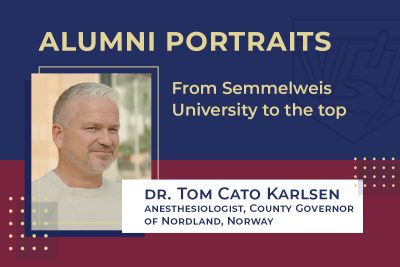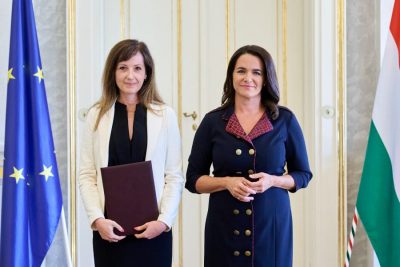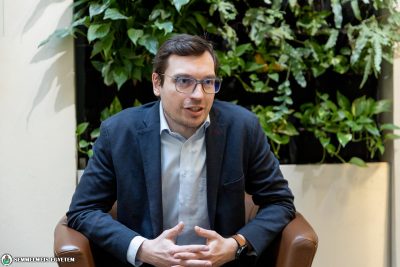As of 1 November 2020, Dr. Klára Gadó has been appointed director of the first geriatric clinic in the country, which was established in the Szent Rókus Clinical Block of Semmelweis University. The Geriatrics Clinic and Center for Nursing Sciences was opened with a capacity of 125 beds, and its in-patients are treated with a special approach that characterizes the care of the elderly. As the director emphasizes, in geriatrics, it is of paramount importance to look at the person in his/her entirety, and this view is intended to be passed on to the physicians and health care practitioners of the future as well.
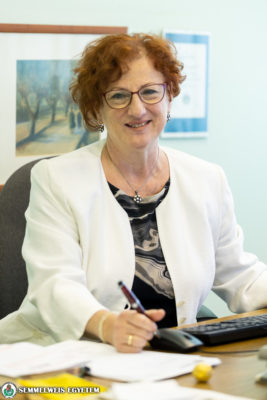 Dr. Klára Gadó graduated at the Faculty of Medicine of the university. Then, following the family traditions – both of her parents were microbiologists -, she began her career as a researcher. In the course of her specialized training of clinical pharmacology that she spent at the 1st Department of Internal Medicine of the former Imre Haynal University of Health Sciences, she was fascinated by the beauty of patient care, therefore she also passed the specialized examinations in internal medicine, immunology and hematology. As Dr. Klára Gadó recalls, she got acquainted with geriatric care by chance. She was working as the head of the internal medicine-immunology department at the former Szent Rókus Hospital, when active care at the institution ceased in 2007, after which she became chief physician of the internal medicine rehabilitation department.
Dr. Klára Gadó graduated at the Faculty of Medicine of the university. Then, following the family traditions – both of her parents were microbiologists -, she began her career as a researcher. In the course of her specialized training of clinical pharmacology that she spent at the 1st Department of Internal Medicine of the former Imre Haynal University of Health Sciences, she was fascinated by the beauty of patient care, therefore she also passed the specialized examinations in internal medicine, immunology and hematology. As Dr. Klára Gadó recalls, she got acquainted with geriatric care by chance. She was working as the head of the internal medicine-immunology department at the former Szent Rókus Hospital, when active care at the institution ceased in 2007, after which she became chief physician of the internal medicine rehabilitation department.
“On the basis of this, after the merger of Szent Rókus Hospital and Semmelweis University, the Geriatrics Clinic and Centre for Nursing Sciences was established last year, which is the first clinic in the country specializing in geriatrics. In addition to cardiology and oncology, geriatrics is the field of health care affecting most Hungarian families, as in general, a significant part of the patients of geriatric care is above the age of 60. Geriatrics has now become an independent discipline, since the care of the elderly requires a special knowledge and approach, which is why the establishment of the first geriatric clinic is a historic step from the university”, highlighted Dr. Klára Gadó.
She pointed out that the clinic was established as a joint institution of the Faculty of Medicine and the Faculty of Health Sciences and it forms a bridge between the two faculties as well as the two professions. Dr. Klára Gadó has also been working at the Faculty of Health Sciences since 1995: initially as a lecturer, and today as a college professor, department head, and deputy dean. Dr. Klára Gadó considers teamwork as well as the partnership between a physician and a health care specialist of utmost importance. The director also considers the formation of attitude as her main goal in the field of education as well.
“Only such a person may become a good physician, who is completely aware of nursing tasks and who is able to verify so, if necessary. This is the approach that we also represent during the summer nursing practice of first-year medical students. In addition to their lexical knowledge, it is very important for future physicians and health care professionals to turn to the patient with the right attitude and see the patient in his/her entirety”, she emphasized.
“We always treat the patient as a partner. We have to gain their trust, to be congruent, because that is the only way we may receive their cooperation for the therapy. Also, we should always treat our patients the way we would expect someone to treat our loved one”, Dr. Klára Gadó highlighted the major principles of their practical education.
The clinic provides nursing practice for first-year medical students, practice in internal medicine for third-year and fourth-year students, as well as summer training practice for medical students of senior years. In addition, professional training practice opportunities for nursing, dietetic and physiotherapy students are running uninterruptedly.
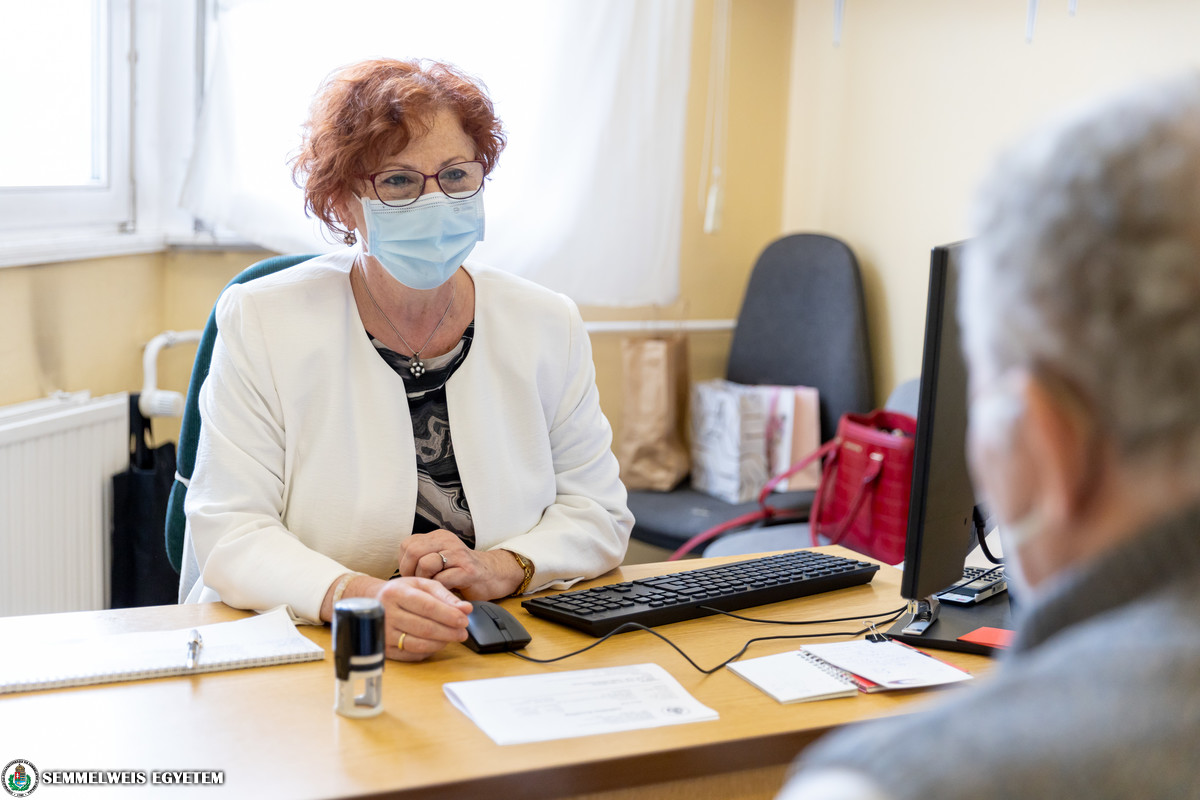 According to Dr. Klára Gadó, in addition to pediatrics, geriatrics is the other discipline where it is primary to look at the patient in his/her entirety. Most people have more complaints, chronic diseases above a certain age, and the delicate balance of the human body is very easily disturbed if we intervene rudely. Therefore, as she pointed out, we must always consider what the problem is, which we can remedy, and this should also be taken into account during the medical examination and when choosing a therapy. Consequently, in geriatrics, the designing of a therapy takes much longer, since more attention must be paid to drug interactions and side effects.
According to Dr. Klára Gadó, in addition to pediatrics, geriatrics is the other discipline where it is primary to look at the patient in his/her entirety. Most people have more complaints, chronic diseases above a certain age, and the delicate balance of the human body is very easily disturbed if we intervene rudely. Therefore, as she pointed out, we must always consider what the problem is, which we can remedy, and this should also be taken into account during the medical examination and when choosing a therapy. Consequently, in geriatrics, the designing of a therapy takes much longer, since more attention must be paid to drug interactions and side effects.
In addition to the nursing and chronic rehabilitation wards with a capacity of 125 beds, the clinic has been providing 15 active beds in order to serve geriatric care in the traditional sense after the epidemic. Here, patients may be admitted with various complex problems. The goal in this field is to achieve the highest possible level of patient independence and quality of life.
 The director classifies geriatric specialist training and hence the provision of labour supply as priority areas, in which the clinic may play an important role, and she also considers prevention and the education of laymen as significant tasks.
The director classifies geriatric specialist training and hence the provision of labour supply as priority areas, in which the clinic may play an important role, and she also considers prevention and the education of laymen as significant tasks.
“Even before reaching old age, we need to be aware of what we need to change in order to live a long life in as good health as possible”, Dr. Klára Gadó emphasized.
She considers the unity of healing, education and research to be important. In connection with the latter, the clinic is looking for cooperation opportunities not only with the Faculty of Health Sciences, but also with other faculties and institutes of the university. Leading research topics in geriatrics include a very topical issue, post COVID disease, as well as the issue of nutritional disorders, muscle weight loss, the prevention of falls, and postoperative rehabilitation. Her personal area of research is old age and problems related to blood coagulation.
Dr. Klára Gadó’s commitment to medicine is also evident in the field of art. Although she deals with photography as a hobby, she has already had several exhibitions, and some critics say that her photos also evoke the abstract sight of tissue sections.
“Klára Gadó conjures up the macro and magnifies the micro”, wrote photographer Éva Keleti in connection with one of Dr. Klára Gadó’s photo exhibitions.
Pálma Dobozi
Photo: Attila Kovács – Semmelweis University
Translation: Katalin Illés-Romhányi
